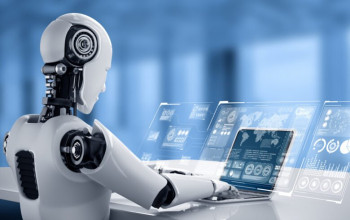To stay competitive in an era of globalization and fast-moving business requirements, enterprises need to implement innovative technologies. They have to anticipate their biggest challenges and introduce technology that reduces costs, improves scalability, enhances accuracy, increases speed, and makes human efforts efficient.
Also Read:- 5 Skills You Need to Become a Machine Learning Engineer
The advancements in Artificial Intelligence (AI), Robotic Process Automation (RPA), and the ever-greater computing power have encouraged a new generation of software and hardware robots with functional applications in every industry. Artificial Intelligence (AI) by theory is the development of computer systems able to accomplish duties that ordinarily expect human intelligence. Robotic Process Automation (RPA), is another advancement in AI, which is the application of technology that empowers employees to understand, perform, and monitor daily tasks. It virtually helps in enhancing mundane tasks to recognize patterns, learn and adapt to new situations or environments. RPA leverages innovative software capabilities made potential by breakthroughs in computing power, which includes natural language processing (NLP), machine learning (ML), artificial intelligence, and speech recognition.
Actually, What is Intelligent Automation?
For enterprise application development services, various complicated processes continue to demand manual workarounds, which results in employees spending valuable time on limited resources and constant manual processes. Intelligent Automation is an innovative fusion of Robotic Process Automation (RPA) and artificial intelligence technologies that collectively enable rapid business process automation and accelerate the entire digital transformation.
Over the years, innovative progression has been made in addressing some of the significant hurdles of AI and RPA combined deployment. The accelerated growth in the availability and accessibility of big data analytics coupled with vast computing potential, promptly available through the cloud, have supported these developments. These recent improvements in AI are designing a new generation of systems that are distinguished from the previous DSS and knowledge-based systems. Advances in ML are empowering the improvement of algorithms that allow cognitive tasks recognized in knowledge and service work.
Also Read:- Startups, startups everywhere! So, it’s time to move, isn’t it?!
How Has Intelligent Automation Influenced Business Performance?
It Diminishes Human Error
Humans are inclined to creating errors because they can get influenced by several personal factors like health, mood, distractions, etc. Machines, however, do not get affected by these and can perform the same tasks with more accuracy.
Moreover, an intelligent automated process is much more substantial than a manual process. No matter what, employees can always depend on an automated process to deliver the same results every time.
Thus, automated systems and processes using intelligent automation can support your business to reach unparalleled levels of quality and reliability.
Process Large Volumes Of Complex Data
As an enterprise continues to expand, especially web application development companies gather an enormous volume of data in the process. Analyzing these data manually could be extremely laborious, and might even require a lot of time. Therefore, with the implementation of intelligent automation and RPA, data management becomes much easier. Various mundane and repetitive tasks, such as data aggregation and curation can be seamlessly processed with automation. Moreover, utilizing RPA in large data repositories makes tasks such as data cleansing, normalization, data wrangling, and creation or updating of metadata more efficient. All these tasks are profoundly repetitive, and each data access circumstances requires special considerations.
Also Read:- How the Internet of Things relates to Artificial Intelligence
It Enhances Customer Service
Intelligent automation can be implemented to enhance customer service delivery and customer satisfaction. It can create automated assistants that can manage customers’ needs 24/7 without any interruption. Not only that, it can enable employees to concentrate more on achieving better customer service, by taking over their repetitive and mundane tasks.
AI-based intelligent chatbots are one of the best examples of how intelligent automation can help enhance customer service. The best part is that these chatbots can be implemented for any industry, website, platform or devices. Therefore, enabling a lot of businesses to utilize conversational, AI-powered, chatbots that can further solve customer queries in real-time and guide them to relevant resources to drive conversions.
Also Read:- How to Advance Your Business Through Artificial Intelligence
Intelligent automation is a compelling technology that has the potential to disrupt the contemporary industry landscape and transform the way things are done. With its numerous business benefits and easy integration processes, intelligent automation can be deployed in everything from IoT services to product engineering and software development. Most importantly, now is the time to start your organization on the automation journey so you too can begin experiencing the benefits of process acceleration, greater efficiency, and quality results.



























